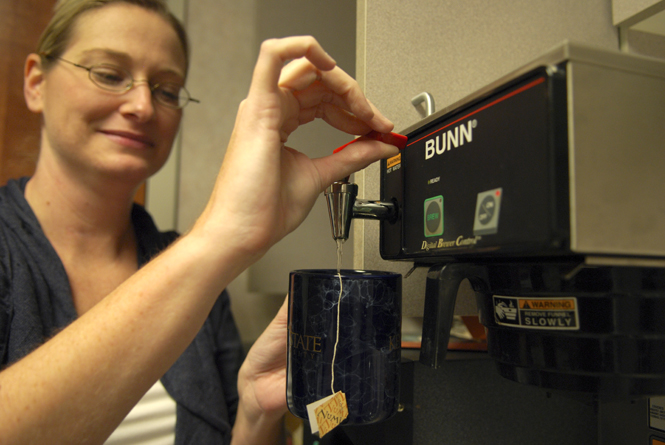Less funding for teachers’ lounges
Director of Public Relations and Marketing Communications Jennifer Kramer made a cup of tea in a break room in Moulton Hall Tuesday, Oct. 25. A new policy requires faculty and staff to buy their own coffee and tea. Photo by Monica Maschak.
October 25, 2011
Due to revisions in Kent State’s hospitality policy, students and faculty may see restrictions in what activities university funds will cover.
The changes clarify the funding allowed for entertainment purposes, along with food and beverage consumption.
Anne Brown, associate vice president for business and administration services, said one of the biggest changes in the policy is that the university will no longer provide faculty with food and beverages in the office.
“We have to be very careful as a public institution about the use of funds for private consumption, so that’s why that came under attention,” Brown said.
An event is considered hospitality if it is for the purpose of reception and entertainment of visitors and guests of university. If the event falls under the coverage of the university, the cost of food, non-alcoholic beverages, entertainment and other miscellaneous costs will be covered by university funds.
#KWhospitality
new TWTR.Widget({
version: 2,
type: ‘search’,
search: ‘#KWhospitality’,
interval: 6000,
subject: ”,
width: 240,
height: 300,
theme: {
shell: {
background: ‘#b8b8b8’,
color: ‘#66a9c5’
},
tweets: {
background: ‘#b8b8b8’,
color: ‘#444444’,
links: ‘#1985b5’
}
},
features: {
scrollbar: true,
loop: true,
live: true,
hashtags: true,
timestamp: true,
avatars: true,
toptweets: true,
behavior: ‘default’
}
}).render().start();
Stanley Wearden, dean of the College of Communication and Information, said the policy is not meant to abolish food and entertainment; it is mainly to clarify who is paying for the food and entertainment.
“There is not a problem with having food and beverages; the problem is if it’s being paid for out of the operating budget,” Wearden said. “We really need to make sure that it’s appropriate use of those funds.”
Brown said the revision also clarifies violations to the policy.
“There wasn’t anything that addressed that in the previous policy,” she said. “If somebody is found to be in violation of the policy, they may be required to reimburse the university for the funds, and there could be disciplinary action.”
The business and administration services office had been working on the revisions for around two years, Brown said. A first draft was sent through several offices including the business and finance division, the president’s cabinet and several academic offices before a final draft was approved.
“It took a long time because of other priorities that we were trying to shuffle at the same time, but we wanted to try to be as thorough as possible to consider different perspectives,” Brown said. “And we’re still working through that.”
Daniel Mahony, dean of the College of Education, Health and Human Services, was one of the deans who was asked to provide feedback to a draft of the policy. He said being able to provide input gave the policy a better chance of fitting the needs of the staff.
“I think the policy they came up with was better because of that,” he said. “Because we had the opportunity to say, ‘OK, this will work for us, and this won’t, here are some of the issues we have currently.’”
Mahony said the biggest impact of the revisions is the clarification of the policy’s terms.
“I think it just made it easier for us to plan, ‘OK, how much can we spend given the size of the group we expect to be at that meeting,’” he said. “I think it just clarified things; I don’t think it has really changed what we do on a day-to-day basis.”
Along with the changes to the policy, Wearden said he developed a pre-approval form for faculty in CCI who want to sponsor an activity that they think could be paid for by the university funds.
“I just don’t want to find faculty or staff in the position of having gone out and bought supplies and food for some sort of event only to find out that we can’t reimburse them for it and they are stuck with that out-of-pocket expense,” he said.
Wearden said the policy revisions provide a way for the university to make appropriate choices with student tuition and taxpayer money.
“There is this perception that it’s this horribly draconian thing that is going to make everyone’s lives miserable,” he said. “It’s really not that big of a change. It’s just an adjustment to make sure that we’re always being responsible and accountable for the way that we spend tuition dollars and tax dollars, and particularly in this economy.”
Contact Kelly Tunney at [email protected].












